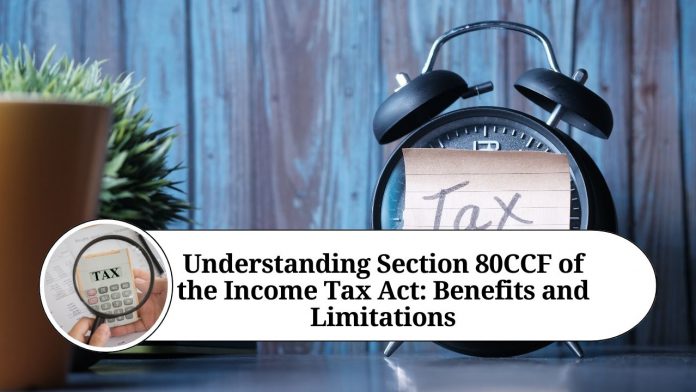The Indian government offers various tax-saving options to the citizens of India to encourage savings and investment. One such option is Section 80CCF of the Income Tax Act. This section was introduced in 2010 to encourage investment in infrastructure bonds issued by various companies, financial institutions, and banks. In this blog, we will discuss the benefits and limitations of Section 80CCF of the Income Tax Act.
What is Section 80CCF of the Income Tax Act?
Section 80CCF of the Income Tax Act allows individuals and Hindu Undivided Families (HUFs) to claim a deduction of up to Rs. 20,000 from their taxable income for investment in notified infrastructure bonds. These bonds are issued by entities such as Power Finance Corporation Limited, National Highway Authority of India, Rural Electrification Corporation Limited, and others.
Benefits of Section 80CCF of the Income Tax Act:
- Tax Savings: The primary benefit of investing in infrastructure bonds under Section 80CCF is that it provides tax savings. An individual can claim a deduction of up to Rs. 20,000 from their taxable income, which can help in reducing their tax liability.
- Long-term Investment: Infrastructure bonds have a long tenure of 10 to 15 years, which means that investors can benefit from regular interest payments throughout the tenure. This can help in creating a steady source of income for the investors.
- Safe Investment: Infrastructure bonds are considered to be a safe investment option as they are issued by government-backed entities, which makes them less risky compared to other investment options. Moreover, the interest rate on these bonds is fixed, which means that investors can plan their investments accordingly.
Limitations of Section 80CCF of the Income Tax Act:
- Limited investment options: Under Section 80CCF, investors can only invest in notified infrastructure bonds issued by specific entities. This limits the investment options available to investors.
- Lock-in period: Infrastructure bonds have a lock-in period of 5 years, which means that investors cannot withdraw their investments before the completion of the lock-in period. This may not be suitable for investors who require liquidity in their investments.
- Cap on tax deduction: The tax deduction under Section 80CCF is limited to Rs. 20,000 per financial year, which may not be sufficient for investors with higher income levels.
Conclusion
In conclusion, Section 80CCF of the Income Tax Act provides an opportunity for individuals and HUFs to save taxes and invest in infrastructure bonds issued by specific entities. While it offers tax savings, a long-term investment option, and a safe investment, it also has some limitations, such as limited investment options, a lock-in period of 5 years, and a cap on tax deduction. Investors should carefully consider these benefits and limitations before making an investment decision. Ultimately, it is advisable to consult with a financial advisor to understand the implications of Section 80CCF and make an informed decision.
Read more useful content:
- section 234e of income tax act
- section 286 of income tax act
- section 90a of income tax act
- section 40a(7) of income tax act
- section 226(3) of income tax act
- section 24 of income tax act
Frequently Asked Questions (FAQs)
Q: What is Section 80CCF of the Income Tax Act?
A: Section 80CCF is a provision in the Income Tax Act that provides a deduction to individuals for investments made in infrastructure bonds.
Q: Who is eligible to claim a deduction under Section 80CCF?
A: Any individual or Hindu Undivided Family (HUF) can claim a deduction under Section 80CCF.
Q: What is the maximum deduction available under Section 80CCF?
A: The maximum deduction available under Section 80CCF is Rs. 20,000.
Q: Can an NRI claim a deduction under Section 80CCF?
A: No, NRIs are not eligible to claim a deduction under Section 80CCF.
Q: What is the tenure of the infrastructure bonds under Section 80CCF?
A: The tenure of the infrastructure bonds under Section 80CCF is 10 years.
Q: What is the rate of interest offered by the infrastructure bonds under Section 80CCF?
A: The rate of interest offered by the infrastructure bonds under Section 80CCF varies from one issuer to another.
Q: Is there any lock-in period for investments made under Section 80CCF?
A: Yes, there is a lock-in period of 5 years for investments made under Section 80CCF.
Q: Can the deduction under Section 80CCF be claimed in addition to other deductions?
A: Yes, the deduction under Section 80CCF can be claimed in addition to other deductions such as Section 80C, Section 80D, etc.
Q: Is the investment in infrastructure bonds under Section 80CCF exempt from tax?
A: No, the investment in infrastructure bonds under Section 80CCF is not exempt from tax. The interest earned on these bonds is taxable.
Q: Is there any limit on the number of infrastructure bonds that can be invested under Section 80CCF?
A: No, there is no limit on the number of infrastructure bonds that can be invested under Section 80CCF, but the maximum deduction available is limited to Rs. 20,000.




















